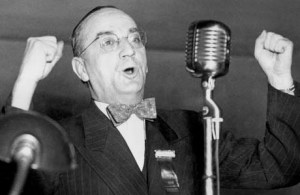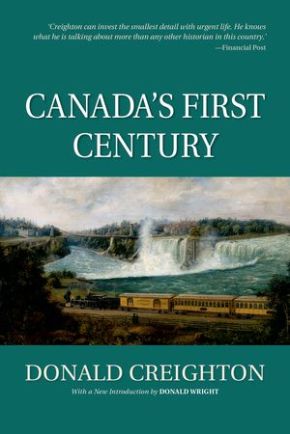The Colony of Unrequited Dreams by Wayne Johnston
Genre: Biographical Fiction, Political Fiction, Historical Fiction, Bildungsroman
Publication Year: 1998
Edition Read: 1999 Vintage Canada paperback edition
Major Accolades: Thomas Raddall Atlantic Fiction Prize, 1998; Canadian Authors Association Award for Fiction, 1999; shortlisted for Giller Prize and Governor-General’s Award for Fiction, 1998; Canada Reads selection, 2003.
Newfoundland and Labrador is an interesting the province – the last to join Confederation, one of the most distinct cultures in English Canada, and one of the most remote provinces in Canada. I have family connections to the province; my grandfather was born in the early 1920s and as such was a member of that last generation of Newfoundlanders that experienced life in both an independent and confederated Newfoundland. I remember as a youngster him showing me his Newfoundland memorabilia: coins and bills from the Dominion, postage stamps, and the medals he received for serving in the Newfoundland company of the Empire forces during World War II. Even though he moved to Nova Scotia in the late ‘40s and married a New Brunswick francophone in the early ‘50s, many of the old traditions of rural pre-WWII Newfoundland survived in his home until his death in 2007. Even though it is one of the few provinces I have never visited, I have a great affinity for Newfoundland.
Joey Smallwood is a name that is synonymous with Newfoundland. He dubbed himself the “Last Father of Confederation” and once elected premier he ruled with an authoritarian streak that would make Donald Trump proud for over two decades. Whatever one may think of Smallwood, is it indisputable that you cannot understand that period of the province’s history without understanding him. With that in mind, you must give kudos to Wayne Johnston and the guts it must have taken to even contemplate the idea of writing a sweeping epic with Joey Smallwood as the main character (and narrated from his first-person point-of-view nonetheless).
Epic in its proportions, The Colony of Unrequited Dreams is one of the most satisfying books I have read in a while. It combines politics, romance, elements of the bildungsroman, and as much Newfoundland culture as you can handle. The character of Smallwood and his true-love/archenemy Sheilagh Fielding are about as well developed as characters can be in a work of fiction, and that is the true power of this book. As a reader, you spend decades with Smallwood and Fielding – you mourn their failures and celebrate their triumphs. Equally as impressive as Johnston’s character development is his ability to shift narrative point-of-view and exposition style. At regular points throughout the book, Smallwood’s narration is injected with snippets of book chapters, journal entries, and newspaper columns written by Fielding. Johnston managed to create a very distinctive first-person viewpoint in these pieces and they serve a fantastic contrasting or context setting device.
This novel was featured on Canada Reads in 2003. It was defended by Justin Trudeau, long before he got into politics; Trudeau ended voting against Colony in the final round to crown Next Episode as the winner and to this day he remains the only panelist in the 15 years of the competition to vote against his or her own book. One of the primary criticisms of the novel on that show, as well as on some other amateur reviews I’ve read, is that from a biographical standpoint, Johnston takes some severe liberties with Smallwood’s story. It is true, he does – for instance, Smallwood was not on the SS Newfoundland during the infamous sealing disaster and, from a larger perspective, Fielding was not a real person. My response is… who cares? I would refer anyone who criticizes the book on this basis to the second paragraph above: “Joey Smallwood is a name that is synonymous with Newfoundland.” While the central character of The Colony of Unrequited Dreams is Joey Smallwood, I read this book as the story of Newfoundland during the formative years of 1900-1949 first, and as a story of Joey Smallwood second.
This is a long and engrossing book that should be read slow. It needs to be savored and chewed on slowly or else you risk just pounding through the magic (although I feel this is the case with all books and am a subscriber to the school of slow reading). The Colony of Unrequited Dreams has aged very well in the twenty years since it was published.
Intolerable: A Memoir of Extremes by Kamal Al-Solaylee
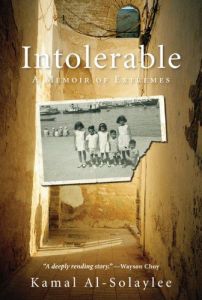
Selected for Canada Reads 2015
Winner of the 2013 Toronto Book Award
Shortlisted for the 2012 Hilary Weston Writers’ Trust Prize for Nonfiction
I don’t read a lot of memoirs. It’s not that I have something against the genre, I have at least 10 on my to-read list, I just never seem to pick many up. This year’s Canada Reads included a memoir by journalist and professor Kamal Al-Solaylee – Intolerable: A Memoir of Extremes. This books charts his development as a gay man in the Middle-East and his eventual relocation to his adopted home of Toronto. This short memoir is so much more than an individual man’s coming-out narrative. Intolerable is a thought-provoking blend of personal memoir, family dynamics, history, economics, and political science. Ultimately, this is the story of Kamal Al-Solaylee, but the sentiments he espouses are no doubt almost universal amongst the millions of immigrants in Canada.
What I loved about this memoir was the holistic approach Solaylee took. There are three broad topics that he tackles: his own development and coming out as a gay man, his relationship with his family, and the increasing religiosity and intolerance in the Middle East. Each of these three threads is tied into the others and seamlessly flows into every chapter.
This book really grabbed me. The author’s background as a journalist really shows in his easy to read and highly informative prose. With the perspective of a Yemini who lived in Cairo and Beirut over the course of several decades that is now solidly Canadian, the author gives a stellar account of the rise of religious intolerance in the Arab world and succinctly gets down to the root causes as he experienced them. It would be surprising for a lot of readers to realize that this state of affairs in this part of the world is a relatively new thing. Solaylee discusses how when he was a kid his sisters would go bikini shopping for their summer vacation while now they must wear a niqab and be accompanied by a man. He gets into the root economic causes that spurned this social change and even throws out some ideas about what the cures may be – including some thoughts on the Arab Spring.
Ultimately though, this is a story of family. Solaylee has a relationship with his family that is complicated beyond what any native born Canadian could really comprehend. The youngest of over 10 kids, and the son of an illiterate lower class mother and former business tycoon father, Solaylee could tell from an early age he was different from his siblings – and this feeling only got stronger as time went on. As more and more distance was between him and them, and the situation in the Middle East deteriorated, things became even more complicated. And as his cosmopolitanism grew, his unhappiness with their situation increased.
So looking through the lens of this year’s Canada Reads theme, “One Book to Break Barriers,” this book shatters a lot of them. Solaylee’s memoir explores homosexuality in the Third World, the nature of Islamic intolerance in the Arab world, post-colonialism and its lingering effects, multiculturalism and its downfalls, and the immigrant experience. This eye opening memoir is informative, but not dry. It takes points-of-view on issues but doesn’t sound preachy. And, near the end of the book, it is a deeply moving love-letter to Toronto.
Intolerable is one of the best memoirs I have ever experienced. The problem I sometimes run into with this type of writing is that it is so self-centered and devoid of context that as you read you continually ask “why should I care.” Kamal Al-Solaylee is now, without any disrespect intended, a relatively average urban Canadian. He was a journalist for numerous publications after paying his dues and working his way up, and he is now a journalism professor. But, the story of how he got there is fascinating, because it is not simply his story, it is the story of him, a family, and very volatile region. I still have 3 Canada Reads picks to read, but I’m thinking this book may be hard to top.
1867: How the Fathers Made a Deal by Christopher Moore
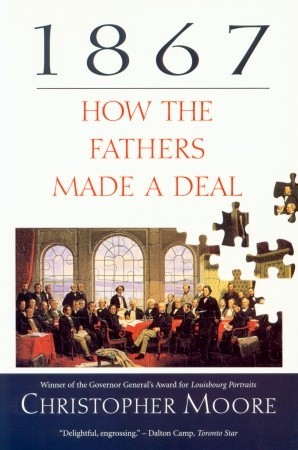
Christopher Moore is one of Canada’s best known current authors of histories. He’s a two-time Governor General’s Award winner (one for non-fiction and one for Children’s lit for a history book for kids) and has been shortlisted for a variety of literary non-fiction awards. He’s a well known columnist, a CBC and NFB documentary producer/host, and does extensive work with numerous historical societies. His work covers numerous topics and he writes in a manner that is both intelligent and accessible. Simply put, he is the guy in Canadian history right now. A few years ago I read and reviewed The Road to Confederation by Donald Creighton, which has long been considered one of the seminal histories of the making of Canada. Since I enjoyed his book so much, Moore’s 1867: How the Fathers Made a Deal sat on my bookshelf, unread, literally for years. It has been a long while since I read Creighton’s book and I was itching to read a history, so this title caught my eye. Funny enough, this was the very first book I added to my “to-read” list on Goodreads when I first signed up.
I expected Moore’s book to simply be another retelling of the story of Confederation, just with his own conclusions that may or may not mesh with Creighton. 1867 was so much more. As the book begins, Moore essentially flat out states that Creighton was wrong. He says that Creighton’s conclusions came out of a very specific point in time and many perpetual myths about Confederation that aren’t 100% accurate (those typically taught in the school system) were drawn from his volume. From there, I knew this book would have a lot to offer. Moore’s story is told through two lenses: first, the constitution building approaches used by the Fathers of Confederation, spanning from the Charlottetown Conference to July 1, 1867; second, how does this historical time compare to the collapse of the Meech Lake and Charlottetown Accords and the approach to these constitutional meetings from 1989 to 1992 (this would be relatively fresh in Moore’s mind, this book was finished in 1997).
1867 is as much a book of Canadian political theory as it is history. Moore uses frequent digressions into modern times for comparative purposes to seamlessly put the history into perspective. His central thesis is that the three Confederation conferences in Charlottetown, Quebec, and London were, at its most fundamental level, exercises in constitution making. He focuses on the different methods that were used to craft this new country: how the political leaders worked with the opposition, the relationship with the electorate, legislative philosophy and functioning, the role of the colonial governors and the British parliament, and the fascinating personalities of many of the participants that have been whitewashed by history over the decades. Moore does a masterful job of contrasting the Confederation meetings with both Trudeau’s 1981-2 meetings and Mulroney’s Meech Lake and Charlottetown meetings to craft the book’s central conclusion.
One of the most important early political accomplishments of colonial British North America was the achievement of what was called “responsible government,” this would now more properly be called parliamentary democracy. Essentially, what this means is that the executive, the cabinet including the Prime Minister, is responsible to parliament (and by extension the people), and not the crown, governor, or chief executive. This means that backbench and opposition members of parliament were tasked with keeping the government in line. Moore’s central conclusion in 1867 is that Canada is no longer a parliamentary democracy; we no longer have responsible government. We have become a pseudo-presidential state where backbench MPs, and opposition MPs, are nothing short of faceless drones responsible solely to the party leader. Moore’s exposition of this is absolutely brilliant – his writing, arguments, and style are formidable and hard to dispute. His arguments are nuanced and much more complex than I can articulate in a short blog post.
This book was revelatory. It was a lot different from The Road to Confederation in many ways. That book was more of a blow-by-blow history told through the lens of 1960s sensibilities. Creighton helped build the cult of Sir John A. and create the mythos of Confederation. Moore’s book, as I stated before, was as much political philosophy as it was history. 1867 uses a mix of history, biography, relevant digressions, political theory, and contemporary contexts to show how relevant the Confederation meetings could be to today’s political circumstances. This is required reading for Canadians who desire more from our elected representatives. This book is 17 years old and still in print, a rarity for a book of Canadian history. I really believe that this will go down as a classic in the genre in Canada.
Ice and Water by John English
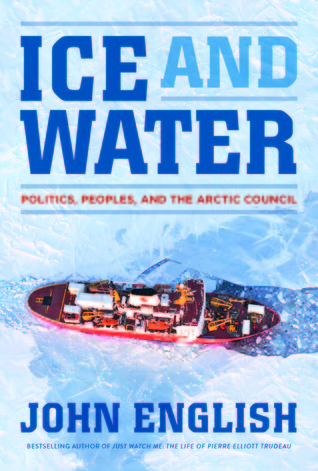
After finishing Death on Two Fronts, I decided to read one more title from the History of Canada Series; I bought Ice and Water at the same time as the last book and it was next in the queue on my Kobo app, so I dove right in. I was looking forward to this title mainly because the actual subject matter interested me; I minored in Political Science and my graduate studies were in Island Studies so I was already fairly familiar with Arctic politics and some of the history around it. This is the fifth title in the History of Canada Series that I’ve read, and unfortunately, it was my least favorite so far. It wasn’t necessarily bad, it just didn’t live up to the expectations I went in with based on my experience with the previous four entries.
Ice and Water: Politics, Peoples, and the Arctic Council by John English is a look at the political history of the Arctic. English provides a bit of pre-World War II context, subsequently looks at Cold War era Arctic politics, and then zooms in on the formation and development of the Arctic Council that took place from the mid-1980s through to today. The book explores the relations between the “Arctic Eight” (Canada, US, Russia/Soviet Union, and the five Nordic countries), indigenous peoples (Inuit, Eskimos, and Saami), and NGOs (such as Greenpeace and the World Wildlife Federation) and how we ended up with the current international Arctic political dynamic. Topics such as sovereignty, defence, the environment, indigenous rights, and economic development are all examined through the lens of Northern politics.
Writing about contemporary history is very difficult – John English admits as much in his acknowledgements. Very little is archived, items may be classified in some way, many of the players are still politically active and therefore reluctant to speak candidly, media accounts that usually make up the primary sources may be unreliable, and most importantly it is hard to draw conclusions from events that have yet to be “concluded.” With that being said, John English must be one exceptionally well connected historian; his book is well researched, meticulously detailed, and leaves no stone unturned. I think it may be this meticulousness that made this title less enjoyable than previous History of Canada titles.
Ice and Water read more like a Master’s thesis than it did a general audience history. It wasn’t written in social science-ese but was very steeped in the conventions of political science and historical academic writing. This caused the book to be very heavy and dense; I usually read in bed at the end of the day and found myself exhausted after about the equivalent of 20 pages – making this is a very slow-read. I read this on my Kobo but the hardcover is almost 400 pages (which I’d argue is a lot for such a topic as Arctic politics).
I don’t want to leave the impression that I didn’t enjoy the book. I liked it, I just didn’t love it. If you have an interest in political history, international relations or Cold War politics, then you may enjoy this, even though it is a bit of a slow slog to finish. If, on the other hand, you like Canadian history but are not interested in any of the aforementioned topics, I would skip this one.
I’ve read only histories and academic titles for over a year now and it was fun while it lasted. But now, my brain needs a shift in my reading list. May 2013 was the last time I read a novel or book of poetry. The time has come to delve back into the exciting world of hardcore CanLit. Here we go…
Death on Two Fronts by Sean Cadigan
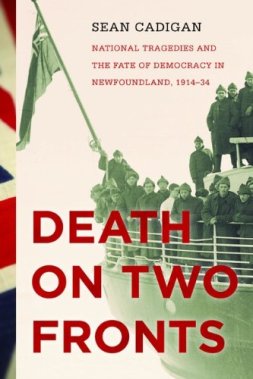
It’s been over a year since my last book review and what a year it’s been. I completed a year of graduate studies in the fascinating, yet obscure, field of Island Studies. And, last but not least, my wife and I had a baby; our little bundle Gavin was born on November 4th, 2013. Now that he’s almost ten months old and actually sleeps through the night, and since I’ve completed all of the academic pursuits I’ll be pursuing for a while, I’m able to start pleasure reading again; so of course, that means new blog posts. Hopefully I haven’t forgotten how to review books, but surely you’ll forgive me if this first one in 15 months seems a little rusty.
For my first book read in almost a year, I decided to start with another title in Penguin’s History of Canada Series that I seem to lust after (in the literary sense). Death on Two Fronts: National Tragedies and the Fate of Democracy in Newfoundland, 1914-34 by Sean Cadigan is one the latest additions to the series. This book charts two decades of political culture in Newfoundland, spanning the years 1914 to 1934. The history is book-ended with the infamous Newfoundland sealing disaster of 1914 (which Kent Stetson dramatized in The Harps of God) and the end of responsible government culminating with the defacto return to crown colony status in 1934. The focus during the intervening years is obviously World War I and its effect on the Dominion of Newfoundland. Cadigan works his story around Newfoundland’s two fronts: the war front in Europe and the domestic political struggles at home.
Cadigan chronicles all of important events during this period with the vivid details and meticulously researched insight – the Newfoundland disaster, WWI battles like Beaumont Hamel and Gallipoli, and the rise of progressive politics and its subsequent collapse. The major political players during the time are the primary figures and Cadigan often uses contemporaneous newspaper editorials to set the stage and situate the contrasting views prevailing in the Dominion at the time.
Newfoundland, during the period Cadigan explores, is a perfect example of “the island” acting as a microcosm of what was, and currently is, taking place in larger states. What I most enjoyed about Cadigan’s book was how relevant it is to today’s political and economic situations. Newfoundland was faced with an extremely polarized political culture and media (a la Fox News and MSNBC), a populace that increasingly demanded publicly funded services with no thoughts given to the cost, public debt that was completely unmanageable, and rising disillusionment with the political process and liberal democracy as a whole. While it is obvious to the reader with a century of hindsight how desperate the government was becoming (selling Labrador was considered a viable option to raise cash) and what the ultimate fate of Newfoundland would be, it was not clear to those involved until the very last moment.
This book worked for me on many levels: the writing was fabulous, the book was well researched, the selection of photographs were wonderful, the subject matter is as relevant today and it was in the early 20th century, the history was analyzed intelligently without being written in social-scienese (which is a challenging task) and the author masterfully balanced details with wide-lens scene-setting. Death on Two Fronts is a fantastic addition to The History of Canada series.
The Destiny of Canada by Christopher Pennington

Penguin’s History of Canada series is one of my new favorite collections. I’ve collected all of the paperback releases and have them on a shelf with Oxford’s Wynford books and Penguin’s other fantastic series, Extraordinary Canadians. The Destiny of Canada, Christopher Pennington’s tale of the 1891 federal election, is the second book in the series that I have read (the first being The Last Act). Pennington takes the reader into the backrooms of the Macdonald and Laurier campaign; legends of Canadian history become fascinating characters (Sir Charles Tupper is my favorite). This book is like porn for the political junkie but is written in a way that anyone with even a passing interest in Canadian history will enjoy.
Pennington’s research was incredibly thorough. It is clear that he must have read thousands of newspaper articles as well as previous academic research. The tone of the book is somewhat sardonic; Pennington goes into great depth on the rampant corruption in almost every element of Canadian politics, but, instead of taking a judgmental tone, he simply expounds the details with a tongue-in-cheek wit. The author makes the case that the 1891 election was one of the most important in our history and it has largely been overlooked. Canada never had an election like the 1860 US vote, where the outcome would bring Earth-shattering consequences; the 1891 election was probably the closest to that which we have had. At stake, argues Pennington, was the fate of Canada. Would we travel down a road that would possibly lead to American annexation or would we stay on the current path which was bringing about severe economic hardships?
Sir John A. Macdonald was the star of the book. Laurier was obviously important, but at this early point in his career, he didn’t have the same gravitas as Sir John. I’ve really come to the conclusion, after reading many books on early Confederation, that Sir John A. was a Machiavellian political master. He did have major accomplishments: he was a leader Father of Confederation and under his reign he added all the territory save Newfoundland to the country, completed the railway, instituted the National Policy, and created what would become the RCMP. But, he also manipulated, bribed, “boodled,” and did just about anything imaginable to hang on to power. The author notes in the epilogue that Laurier was the same when he came to power. This behavior has to be taken into context though; this was perfectly normal and somewhat accepted as politics as usual in Canada in the 19th century. These details have simply been scrubbed out of junior high history books.
The book is filled with all kinds of interesting tidbits. It was common for individuals to run in multiple ridings to hedge their bets and running and serving concurrently in provincial and federal houses was common. And, what interested me very much, were the mentions of the insanely ambitious discussions in the 1880s and 90s to build a tunnel from PEI to NB.
The Destiny of Canada is a fantastic entry in the History of Canada series. It is very readable, it has a solid narrative flow, it is incredibly well researched, it is both balanced and thorough and there are several pages of portraits of the important figures and a good number of editorial cartoons. This book would be enjoyed by Canadian history enthusiasts, political junkies, or anyone who enjoys quasi-political TV shows like The West Wing or Veep.
The other titles in the History of Canada series cover Expo 67, the 1981 constitutional debate, the Fenians, WWII in the St. Lawrence, and the Plains of Abraham battle. Get these on you bookshelves. The History of Canada Series
The Last Act by Ron Graham

Shortlisted for the 2011 Shaughnessy Cohen Prize for Political Writing
Globe and Mail Top 100 Book – 2011
The Last Act by Ron Graham is from Penguin’s new History of Canada series. When I first saw this series in the bookstore, with titles exploring the legendary 1891 federal election, the now mythic Plains of Abraham battle, Expo 67, and the German U-boat battles in the St. Lawrence, I almost had a stroke induced by excitement. A quality series of books, by very reputable writers, digging into events that are known at at least in a general way by the Canadian citizenry is something to be celebrated. I immediately grabbed a pile of these titles and headed to the cash. Since I just finished Donald Creighton’s pair of histories on Canada, I figured this book would be a good follow-up.
Two great things happened to Canada in 1982: I was born and the Canadian Charter of Rights and Freedoms was passed. Ron Graham’s The Last Act: Pierre Trudeau, the Gang of Eight, and the Fight for Canada is an account of the November 1981 conference that resulted in severing one of the last lingering remnants of colonialism. (Eventually we will sever the last and get rid of that anachronistic monarchy that is still technically our Head-of-State). This meeting brought about constitutional patriation, the Charter, an amending formula, and set into motion the wheels of the Quebec sovereignty movement that culminated in the 1995 referendum. While the book focuses on the events of November 4 and 5, there is a great prologue giving historical context and a fantastic epilogue discussing Mulroney’s failed Meech Lake and Charlottetown accords. Ron Graham has written a masterpiece of Canadian political history; it is highly readable and accessible, but also very thoroughly researched and scrupulously cited with a huge bibliography. In years to come, The Last Act will be looked at as an authoritative text on the 1981 constitutional debate.
Something that is interesting about Graham’s writing style is, with the exception of his epilogue, the utter neutrality he takes towards the people involved, especially Rene Levesque whom he tries to portray in as sympathetic manner as possible. As a reader though, depending on your ideological tendencies, you will definitely end up taking sides and developing strong dislikes of certain players (for instance I would have liked to beat Peter Lougheed and Sterling Lyon with a rubber hose).
This book could have become bogged down in philosophical notions of federalism, the role of the courts, and constitutionalism. These ideas are present, but they come out in the words of the players themselves through interviews, quotes, and their general actions. After reading Creighton’s The Road to Canada and learning about how opposed the Fathers of Confederation were to the concept of “provincial rights” and their destructive nature, I was fascinated by the importance of it in the negotiations.
I have always been a huge admirer of Pierre Trudeau, and this book did nothing but deepen that admiration. Trudeau took the long view. By introducing the Charter, he ensured fundamental freedoms for all Canadians. The political scientist in me firmly believes that for a liberal-democracy to function in the interests of its citizens, checks-and-balances need to be in place. The Charter provides this; important changes in Canada’s social fabric were brought about because of the Charter, changes that politicians would be terrified to touch (reproductive rights, same-sex marriage, safe-injection sites, and soon hopefully, assisted suicide). Trudeau was a Canadian visionary, but above all, he was a shrewd political mind, and love him or hate him, in November 1981, he was definitely the smartest guy in the room.
Canada’s First Century by Donald Creighton
It is a very rare occurance for me to read two books by the same author back-to-back, but I felt I would be doing a disservice to Donald Creighton and to the early study of Canadian history if I didn’t read this book. Canada’s First Century is essentially a sequel to the last book I reviewed, The Road to Confederation, and judging by the cover design, the folks running the Wynford Project wanted to link the two titles in this way. This book picks up at midnight, July 1st 1867 and ends with Expo ’67. Post-confederation Canada has a rich and multifarious history and capturing a century of our story in 356 pages is a difficult task. For the most part, Creighton recites the political history of Canada’s first hundred years with chapters roughly divided up by who the Prime Minister was at the time. He wrote this book in the late 60s with publication coming in 1970. The historical interpretation and view of the world/Canada is definitely of its time; the Cold War was raging, the Quiet Revolution in Quebec was in full force, we were becoming almost inseparably linked to the US, and the welfare state system which Canadian’s now proudly identify as part of our collective identity was becoming firmly entrenched into the social fabric of this relatively young nation. All this being said, it is understandable that Creighton had an uncertain and pessimistic view of what the future held for his country.
This author was not short on opinions and he liberally inserted them into his book; something that few credible historians have the guts to do today. He was not ideologically or party driven in his clear admiration for certain Prime Ministers. He had high praise for Laurier and Bennett, but harsh criticisms of Borden and St. Laurent. The level of anti-Americanism that oozes from Creighton is almost militant; he only barely stops short of calling the US blatantly evil hypocrits. A similar level of disdain is also reserved for the Quebec nationalism that was growing in the 60s. Of the last 50 pages, at least a third of it is analyzing the issue of “bilingualism and biculturism.” Like every historian I have ever had the pleasure of working with (they really are fascinating humans), Creighton offers no solutions or predictions; he simply points out the lessons that can learned from our collective experience.
Six months ago I read A Short History of Progress by Ronald Wright which examined how everything that happens does so in a cyclical way and that essentially nothing is without precedent. In the context of Canadian political history, this book shows that everything important in Canadian politics in the last decade also has precedent; be it an American snub of Canada over foreign policy, using rules of parliament and prorogation for political gains, party leadership quarrels, or using debate closure to force controversial legislation through the House of Commons.
Canada’s First Century was a fascinating read because it highlighted both the well-known events in Canadian history, like the Manitoba Schools problem or the WWI conscription debate, and lesser-known episodes of our history and politics. This book didn’t read as smoothly as The Road to Confederation and some parts seemed a bit clunky. Despite this, Donald Creighton certainly captured the nuances of Canada as it stood in the 1960s and certainly provides food-for-thought for where we going and where we are at now, on the eve of our sesquicentennial.
The Road to Confederation: The Emergence of Canada, 1863-1867 by Donald Creighton
Well, it certainly has been a while; one year and 11 days to be precise. It is nice to have a break from being told what to read by a course syllabus and having free-reign in my selections. So here we go. Oxford University Press is currently publishing a series of Canadian books called the Wynford Project. This series is bringing important Canadian titles back into print that have been relegated to obscurity over the decades. One of the first, and most prominent, titles is Donald Creighton’s The Road to Confederation. Originally published in the 1960s, this book gives the reader what feels like an insider look at the birth of Canada. The Fathers of Confederation become characters as opposed to vague historical figures and clear protagonists and antagonists emerge in Creighton’s writing. Most impressively though, this book is filled with subtle, and not so subtle, commentary on Canada as a whole. The introduction by Donald Wright says that this book “reveals as much about the 1960s as it does the 1860s.” The Road to Confederation tells a story of great optimism with a tone of cautious pessimism.
I grew up in Nova Scotia and attended Sir John A. Macdonald high school and all through my school years I heard stories of the great Nova Scotians who helped build Canada. Names like Charles Tupper and Joseph Howe are known, at least in passing, by every bluenoser. For the last ten years I have lived in Charlottetown, which is , as my license plate tells me, the “Birthplace of Confederation.” Like anyone my age, I studied the confederation conferences in school and have distant memories of terms like reciprocity and Fenian raids; but as I have found out over the years, the gritty details of the birth of Canada are left out of the junior high textbooks. Most Canadians have only heard this sanitized version of history. Creighton gives the average reader, even one with no knowledge of our story, an unapologetically honest and unsanitized recap of those raucous four years of political headbutting that lead to Canada, the greatest nation in the world.
Some of the details Creighton reveals are mind-blowing. Here are a few examples, just to grab your attention: the original idea of Maritime union was hatched up by the Lieutenant-Governor of New Brunswick because he thought the small provincial parliaments were embarrassments, the first conference was held in Charlottetown only because the PEI delegation refused to venture to the mainland, George Brown was essentially a raging bigot, PEI chose not to join confederation in 1867 for quite ridiculous reasons, all of the British North American colonies were wholehearted supporters of the South in the American Civil War, and Britain was eager to cast off its North American responsibilities. These are just a few of the many high points.
When you pick up this book you know how it is going to end, Canada comes into being on July 1, 1867, but that doesn’t diminish this book’s power. This is a real page-turner and is what could be easily called the original Canadian political thriller and is highlighted with numerous historical photographs and maps. A history professor I was speaking with about this book suggested that I also read 1867 by Christopher Moore; he said the 30 years between the two books provide a great contrast in the interpretation of our founding. All this being said, this was a fantastic read and I want to thank Oxford University Press for resurrecting this jem.






